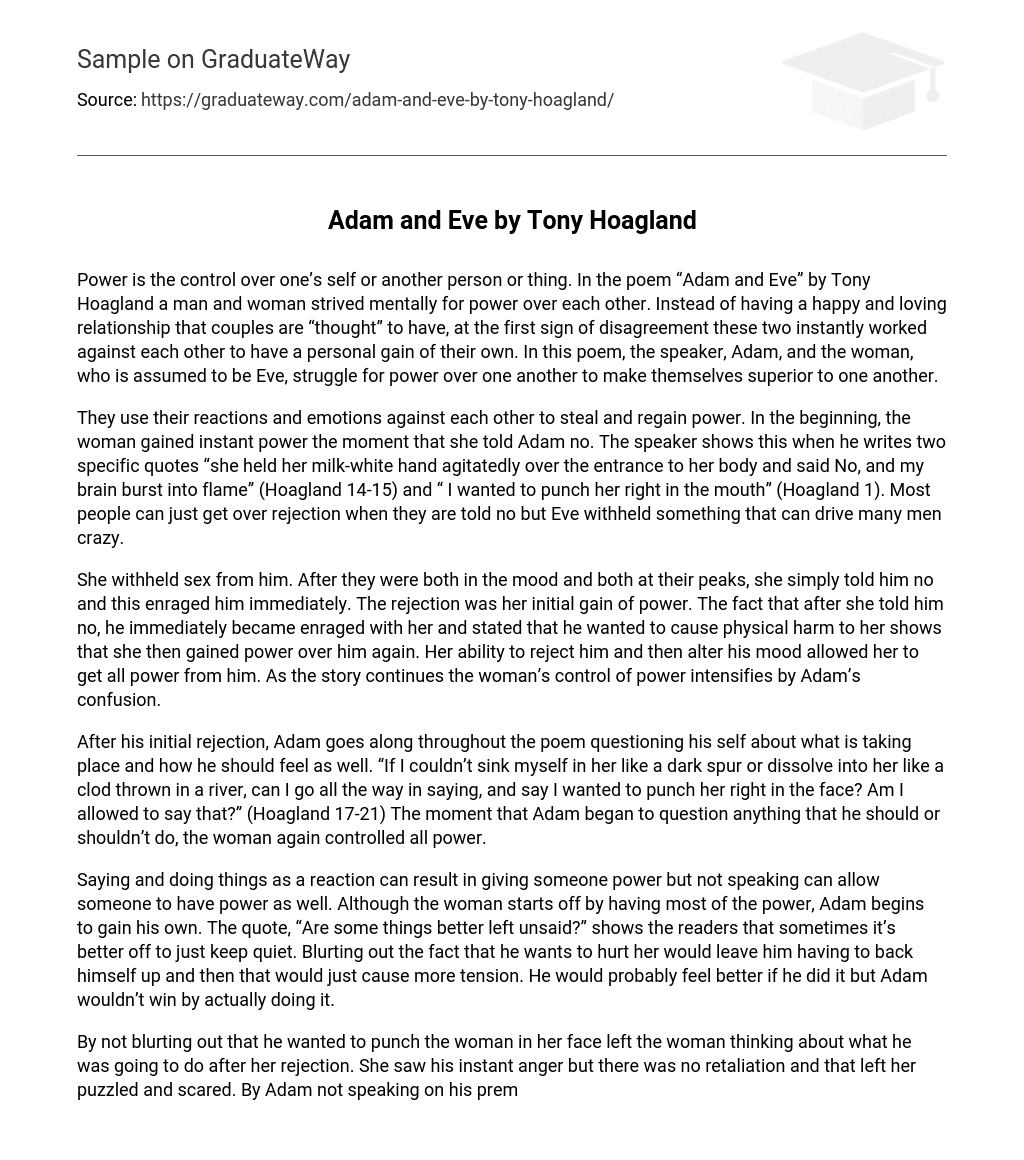In Tony Hoagland’s poem “Adam and Eve,” power is portrayed as the ability to control oneself or others. Rather than fostering a loving relationship, the man and woman in the poem engage in a mental competition to assert power over each other. Instead of nurturing their bond, they automatically oppose and manipulate each other at the slightest disagreement, all for personal gain. Throughout the poem, Adam (the speaker) and Eve constantly struggle for dominance.
They manipulate their reactions and emotions to gain and regain power from one another. Initially, the woman acquired immediate power by refusing Adam. The speaker illustrates this with two explicit quotations: “she held her milk-white hand agitatedly over the entrance to her body and said No, and my brain burst into flame” (Hoagland 14-15) and “I wanted to punch her right in the mouth” (Hoagland 1). While most individuals can easily move on from rejection when told no, Eve withheld something that could drive many men insane.
Despite the mutual desire and sexual peaks of both individuals, she declined engaging in sexual activity with him. This immediate refusal ignited his anger, granting her initial control. The swift emergence of his rage and inclination to harm her signifies her regained influence over him. Through rejecting him and manipulating his emotions, she achieved complete dominance. As the narrative progresses, the woman’s power over Adam intensifies further due to his perplexity.
Adam spends the remaining portion of the poem questioning himself and attempting to comprehend his situation and emotions after initially being rejected. He ponders whether he can confess his desire to physically harm her, acknowledging that the woman still possesses complete authority.
In this text, it is mentioned that both speaking and not speaking can give someone power. At the beginning, the woman has more power, but as the text progresses, Adam gains his own power. The quote “Are some things better left unsaid?” suggests that sometimes it is best to keep quiet. If Adam were to blurt out his desire to hurt her, it would only create more tension and he would have to defend his words. Although he might feel better if he acted upon his desire, it would not ultimately result in him winning.
The woman felt uncertain and fearful when Adam did not express his desire to harm her after she rejected him. Despite being angry, he chose not to retaliate, which confused her. Keeping his premeditated thoughts to himself made her wonder and gave him a sense of control. In a final attempt to assert dominance, Adam withheld information about the woman’s identity and asked the readers if he should reveal her name.
By choosing to withhold the identity of the person in question, he decided to create suspense instead of directly informing us. This decision may have been influenced by a sense of confusion regarding what action to take. However, I believe the main motive for this choice was that establishing a connection with someone comes from knowing their name. Once you possess that information, emotions towards them start to develop, and no one desires sympathy towards someone they intend to harm. Adam gained power over us by leaving her name unrevealed and causing us to wonder, “Who is she?”. Power is not only an internal struggle but also exists within the dynamic between two individuals.
In the context of a couple, their primary challenge arises from their inclination to manipulate power dynamics for personal gain, often at each other’s expense. Whether in agreement or not, one person consistently strives to have an advantage over the other. This ongoing struggle for power persists because it is impossible for both individuals to be equal. Despite society’s expectation of support and unity within relationships, constant competition between partners raises questions about the relationship’s purpose.





